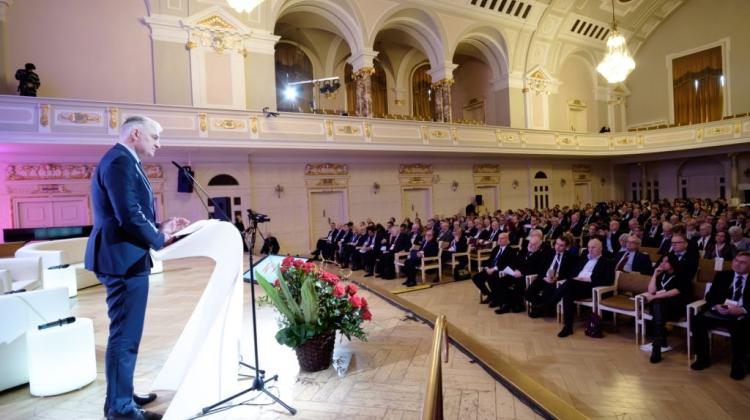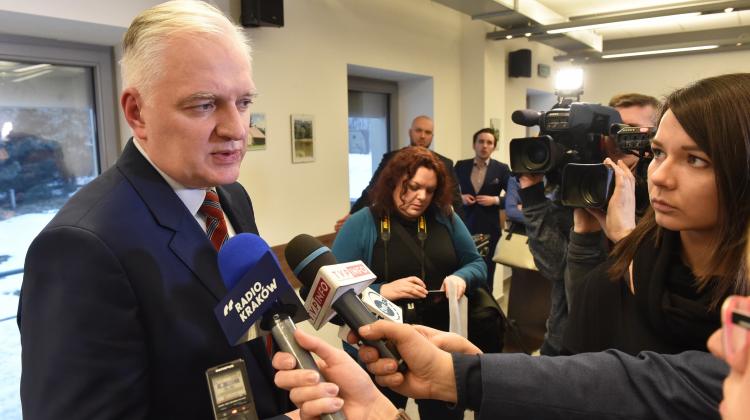Parliamentary committee on science popularisation

In the draft budget for 2014, the Ministry of Science and Higher Education plans more than PLN 40 million for science dissemination activities, announced Deputy Minister of Science Marek Ratajczak.
"As part of activities to support the dissemination of science we try to support various initiatives, such as science festivals and picnics" - said Deputy Minister Ratajczak at a meeting of the parliamentary committee of science. He noted that his ministry subsidizes the activities related to publishing - PLN 14 million is allocated to such projects. PAP - Science and Scholarship in Poland is also subsidised by the Ministry of Science and Higher Education.
activities contributing to the popularisation of science mentioned by Marek Ratajczak also included ministerial programs: Paths of Copernicus, Iuventus Plus, National Programme for the Development of Humanities.
Deputy Minister also mentioned the Index plus program, whose objective is to raise the level of scientific journals in Poland. He admitted that the number of scientific journals in Poland grows rapidly. "It turns out that we have one scientific journal per about 40 active researchers" - said the Minister. He admitted that for the ministry this posed a problem, "which in the future will require additional regulation".
Ministry of Science also provides financial support to scientific societies and the Museum of Technology subject of the Polish Federation of Engineering Associations - NOT. "I would like to remind that the applicable regulations put this type of initiative in a rather difficult situation. They do not really fall in the competence of any ministry or in local government" - noted the deputy minister.
He reminded, however, that the new provisions in the Act on the financing of science should help support such projects. This problem was addressed by Chairman of the Scientific Societies at the Presidium of the Polish Academy of Sciences, Prof. Zbigniew Kruszewski. "We encounter great difficulties in obtaining funds - he said. He asked the parliamentary committee to contemplate this problem.
During the meeting, the committee summarized the activities of the Copernicus Science Centre, co-financed from the budgets of the ministries of science and education. CSC director Robert Firmhofer emphasised that the centre had so far been visited by 3.2 million people, one of the highest turnouts in European science centres. "We\'re not really surprised, this success was preceded by the success of the Science Picnic of Polish Radio and the Copernicus Science Centre, organized in Warsaw for 18 years. This year, the picnic had 150 thousand visitors, which is also a European record for this type of project" - said the director of the CSC.
He reminded that science festivals organized all over the country, children universities and universities of the third age are very popular in Poland. "In my opinion, we are talking here about both the quality, and quantitative impact, which make us one of the most active and best prepared countries in Europe in terms of this kind of modern communication and popularisation of science" - he said.
Undersecretary of State in the Ministry of National Education Joanna Berdzik, referring to the issue of popularisation of science and technology, acknowledged that "in fact the Ministry of Education does not have additional funds for this just a form of activity". The Ministry, however, seeks to implement such projects, for example by announcing the Human Capital Operational Programme competitions. Funds from this programme have been awarded also to the Copernicus Science Centre, which together with the Ministry of Education carries out the project "Copernican Revolution" in support of teaching natural sciences in schools.
PAP - Science and Scholarship in Poland
lt/ krf/ mow/ mrt/
tr. RL
Przed dodaniem komentarza prosimy o zapoznanie z Regulaminem forum serwisu Nauka w Polsce.


















